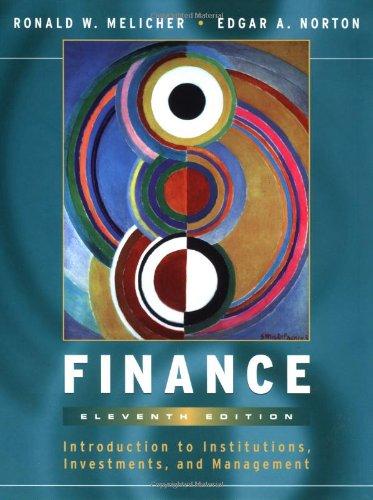Question
(Comprehensive problem ) Traid Winds Corporation, a firm in the 34 percent marginal tax bracket with a required rate of return or cost of capital
(Comprehensive problem ) Traid Winds Corporation, a firm in the 34 percent marginal tax bracket with a required rate of return or cost of capital of 12 percent, is considering a new project. This project involves the introduction of a new product. The project is expected to last 5 years and then, because this is somewhat of a fad product, be terminated. Given the information in the popup window, LOADING...,
Cost of new plant and equipment $14,800,000
Shipping and installation costs $500,000
Unit sales YEAR UNITS SOLD
1 75,000
2 115,000
3 115,000
4 85,000
5 75,000
Sales price per unit $360 /unit in years 1 through 4,
$310 /unit in year 5
Variable cost per unit $100/unit
Annual fixed costs $750,000 per year in years 1-5 Working-capital requirements
There will be an initial working-capital requirement of $260,000 just to get production started.
For each year, the total investment in net working capital will be equal to 20 percent of the dollar value of sales for that year. Thus, the investment in working capital will increase during years 1 and 2, then decrease in year 4. Finally, all working capital is liquidated at the termination of the project at the end of year 5. Depreciation method Use the simplified straight-line method over 5 years.
Assume that the plant and equipment will have no salvage value after 5 years. determine the free cash flows associated with the project, the project's net present value, the profitability index, and the internal rate of return. Apply the appropriate decision criteria.
a. What is the initial outlay associated with this project?
b. What is the annual free cash flow associated with this project in year 1?
What is the annual free cash flow associated with this project in year 2?
What is the annual free cash flow associated with this project in year 3?
What is the annual free cash flow associated with this project in year 4?
c. What is the terminal cash flow in year 5 (that is, what is the free cash flow in year 5 plus any additional cash flows associated with the termination of the project)?
d. What is the project's NPV given a required rate of return of 12 percent?
Based on the NPV criterion, should the project be accepted? (Select the best choice below.)
A.Yes.The project should be accepted because its NPV is positive.
B. No. The project should be rejected because its NPV is negative.
e. What is the project's PI given a required rate of return of 12 percent?
Based on the PI criterion, should the project be accepted? (Select the best choice below.)
Yes. The project should be accepted because its PI is greater than 1.
No. The project should be rejected because its PI is less than 1.
f. What is the project's IRR ?
Based on the IRR criterion, should the project be accepted? (Select the best choice below.)
Yes. The project should be accepted because its IRR is greater than the required rate of return, 12%.
No. The project should be rejected because its IRR is less than the required rate of return,12%.
Step by Step Solution
There are 3 Steps involved in it
Step: 1

Get Instant Access to Expert-Tailored Solutions
See step-by-step solutions with expert insights and AI powered tools for academic success
Step: 2

Step: 3

Ace Your Homework with AI
Get the answers you need in no time with our AI-driven, step-by-step assistance
Get Started


